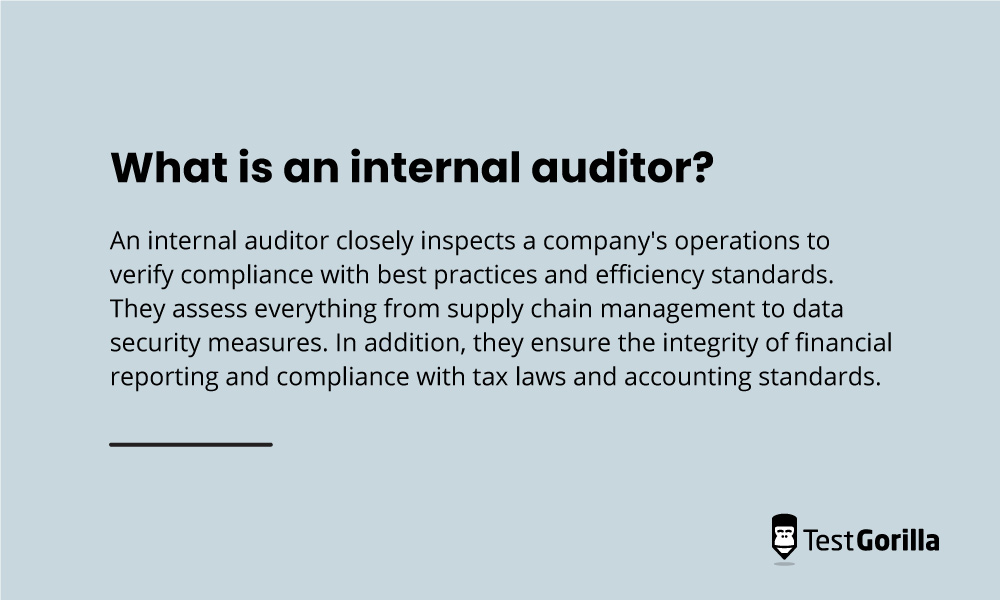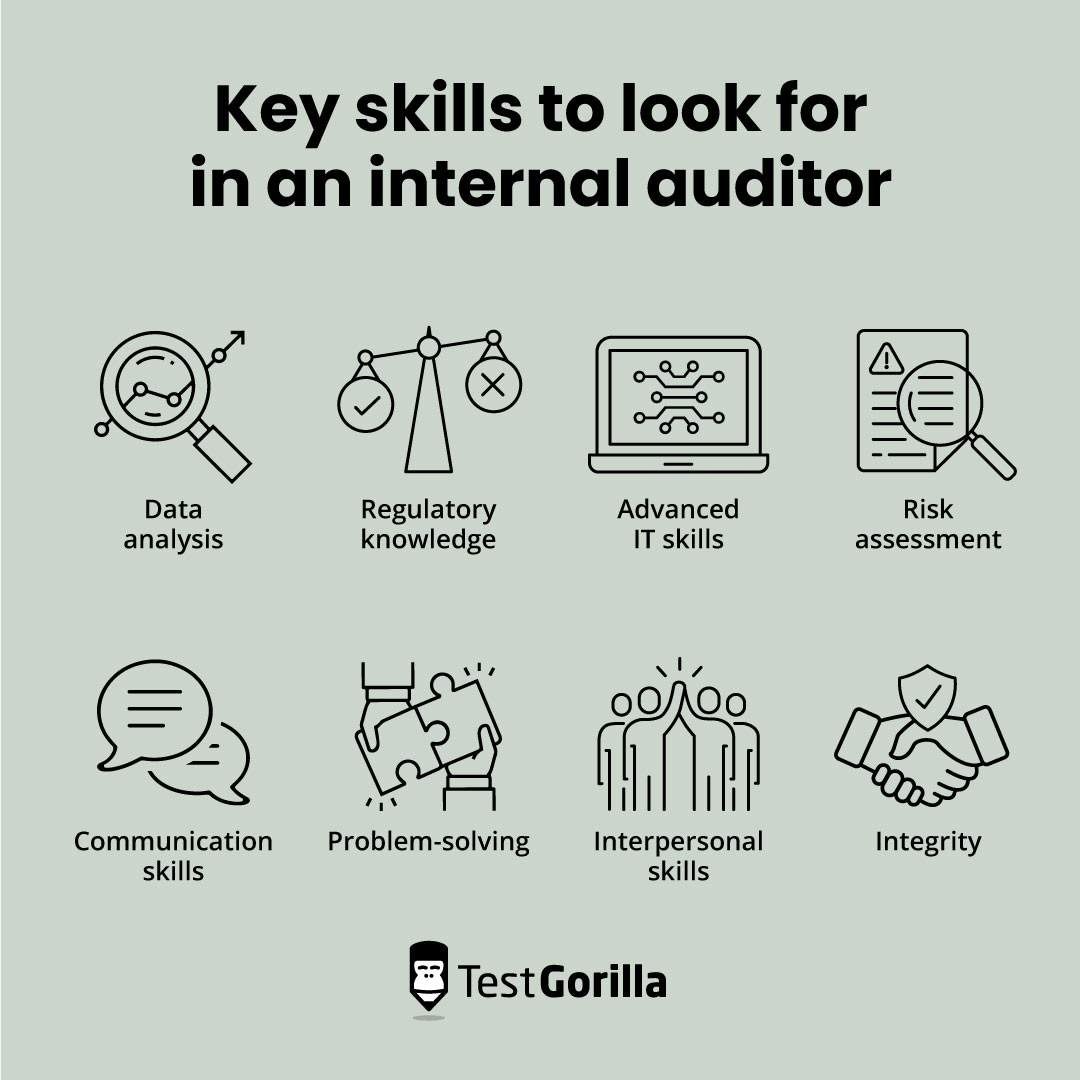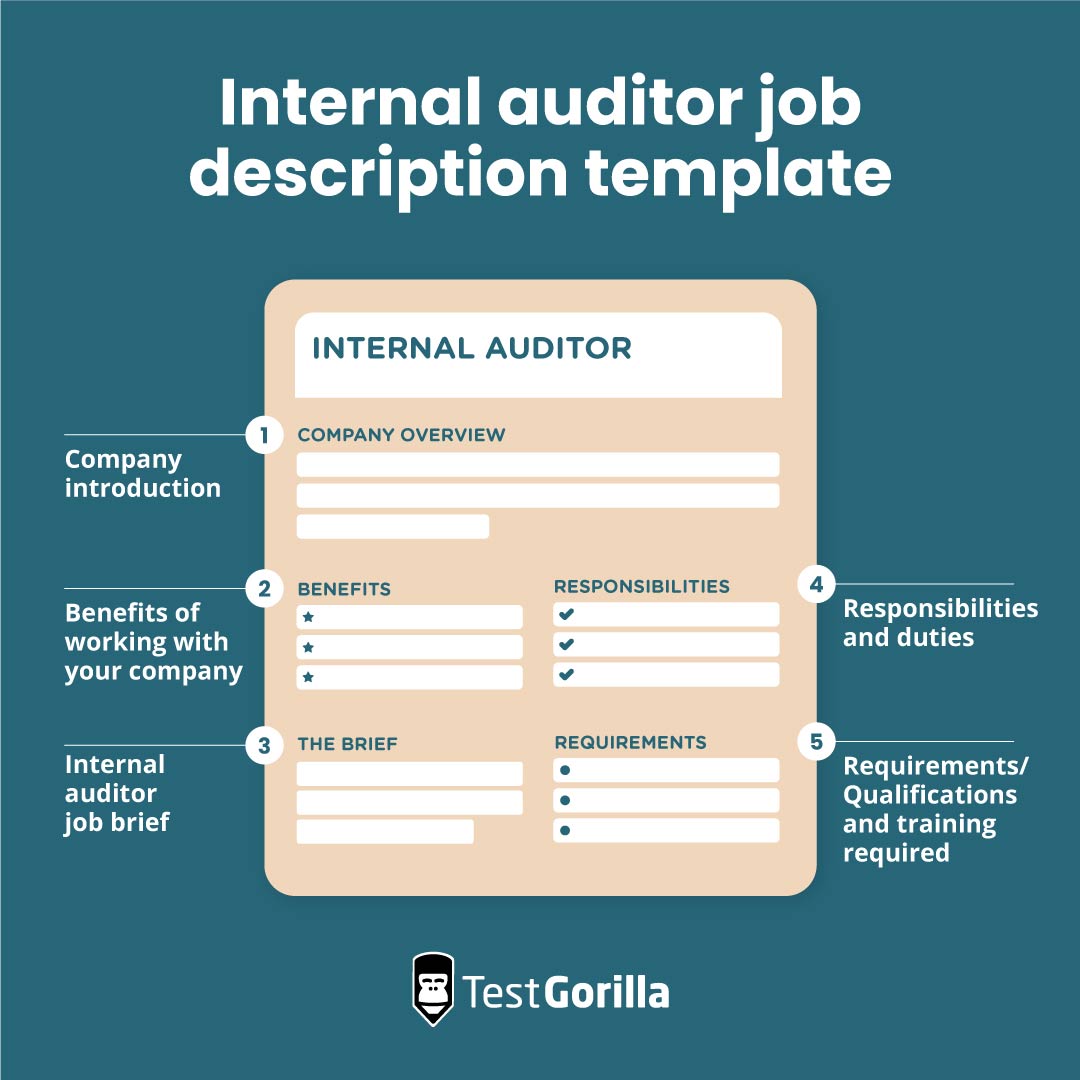With an expert internal auditor on your team, you're ensuring more than just compliance. You're enhancing financial accuracy, reducing risks, and keeping your business operations efficient. They truly make a difference in upholding business integrity.
However, being vague about your regulatory needs and skill requirements in your job description can lead to costly mis-hires. The wrong internal auditor might overlook important details or be unfamiliar with your industry’s specific standards, jeopardizing compliance and performance.
That’s why a comprehensive job description is critical. It ensures new hires grasp the audits they'll conduct and the depth of their responsibilities.
We've got your back. Below, we’ll explain the key skills internal auditors need, how to write a great job description, and some pitfalls to avoid. We also include a detailed template to get you started.
Table of contents
- What is an internal auditor?
- Key skills to look for in an internal auditor
- How to write an effective internal auditor job description
- Internal auditor job description template
- 2 things to avoid when writing a job description for internal auditors
- Next steps: Attracting and assessing internal auditor candidates
- FAQs
- Secure skilled internal auditors with TestGorilla
What is an internal auditor?
An internal auditor closely inspects a company's operations to verify compliance with best practices and efficiency standards. They assess everything from supply chain management to data security measures. In addition, they ensure the integrity of financial reporting and compliance with tax laws and accounting standards.
For instance, they might verify the accuracy of financial transactions or check workflows against internal and regulatory standards. Their role is pivotal in helping the company function smoothly and stay compliant.
Internal auditors differ from external auditors, as they’re usually part of an in-house team. External auditors are usually hired through firms or other third parties.
Key skills to look for in an internal auditor
Internal auditors require a mix of key hard and soft skills to be successful.
Data analysis: Interpreting complex financial data and identifying irregularities
Regulatory knowledge: Understanding relevant industry regulations and compliance standards
Advanced IT skills: Using auditing software, such as ACL and CaseWare IDEA, with a strong understanding of cybersecurity
Risk assessment: Identifying and evaluating potential risks in operations
Communication skills: Effectively conveying findings and recommendations to management and other stakeholders
Problem-solving: Devising strategies to fix mistakes – like discrepancies in financial statements or breaches in compliance protocols
Interpersonal skills: Building relationships within the organization for collaborative audits
Integrity: Upholding ethical standards and maintaining confidentiality
The best insights on HR and recruitment, delivered to your inbox.
Biweekly updates. No spam. Unsubscribe any time.
How to write an effective internal auditor job description
The best job descriptions emphasize skills over other factors like degrees or experience. This is because skills directly reflect an individual's ability to do the job. When preparing your skills-based job description, make sure to highlight these areas.
Start with a position overview
Starting with a clear overview helps candidates grasp the role's essence quickly. For an internal auditor, you might write, "You'll oversee financial reports and ensure we adhere to regulations and our internal standards." This frames the role as essential, inviting candidates who are eager to make a significant impact within the company.
Crafting this section is about balance. Try merging key tasks, like analyzing financial reports, with their broader outcomes, such as streamlining financial processes. The aim is to present a clear, holistic view without excessive detail.
Specify hard and soft skills
When naming the skills and qualifications for your internal auditor role, think about the tools and knowledge they'll use daily. Maybe they must know a specific auditing software or be well-versed in particular industry rules. Those are their technical skills.
But don't forget the personal qualities that make someone excel in the job. For example, an effective internal auditor should possess keen attention to detail, ensuring no discrepancies are overlooked.
Specifying both hard and soft skills will help attract well-rounded candidates.
Highlight growth and development
Pinpoint avenues for advancement. Maybe there's a path from junior to senior auditor or opportunities to lead specialized audit teams. Additionally, emphasize any in-house training sessions or workshops related to the latest auditing tools or regulatory changes.
Spotlighting opportunities for career growth shows candidates your commitment to their individual development, ensuring you attract top talent.
Internal auditor job description template
Start with this template, and modify it to match your specific requirements.
Company introduction
Here, explain what your company is all about. When it was founded, where its offices are or whether it’s fully remote, which products or services it offers, and what it’s accomplished.
Emphasize the significance of internal auditing within your organization. For example, mention how thorough internal audits have played a pivotal role in ensuring compliance and enhancing operational efficiency.
Benefits of working with [your company]
Highlight the advantages of working as an internal auditor at your company, like competitive compensation, health benefits, generous paid time off, or flexible work options. Do you offer ongoing training or opportunities for professional growth? Mention these to entice candidates seeking development in their careers.
Pro tip: Use our guide on internal auditor pay to set a competitive salary and attract top talent to your organization.
Internal auditor job brief
[Company name]
Job title: [For example, Internal Audit Associate, Internal Audit Senior, or Internal Audit Manager]
Reports to: [For instance, Internal Audit Senior, Internal Audit Manager, or Internal Audit Director]
Position Type: [Full-time or part-time; employee or independent contractor]
Location: [Remote, hybrid, or on-site]
[Compensation details]
Internal auditor responsibilities
Review company finances to ensure accuracy and integrity.
Evaluate potential risks that might hinder organizational objectives.
Design detailed audits based on risk assessments.
Review and test processes, such as checking the accuracy of financial entries or validating security protocols, to confirm their effectiveness.
Make sure internal processes adhere to external regulations and company policies.
Document findings and recommend improvements post-audit.
Share findings and best practices with relevant departments.
Stay updated with industry regulations and emerging risks.
Suggest measures to prevent errors, fraud, or regulation breaches.
Requirements/Qualifications and training required
A bachelor’s or master’s degree in accounting, finance, or a related field (or equivalent work experience)
[3+] years' experience in internal auditing, specifically in areas like compliance, operational, or financial auditing
2 things to avoid when writing a job description for internal auditors
Let’s unpack two common mistakes to avoid in your internal auditor job description.
1. Being vague about regulatory needs
Different industries have specific regulations. For example, a financial firm might need expertise in the Sarbanes-Oxley Act (SOX) for transparent reporting, while an online business could prioritize the General Data Protection Regulation (GDPR) for user data safety.
When creating an internal auditor job description, specify the regulations the role will address. Skipping this can draw in candidates lacking the right knowledge, resulting in extra training and possible compliance problems if you hire them.
2. Overemphasizing financial auditing only
Internal auditors wear many hats – their role isn't just about crunching numbers. For example, they may dive into IT systems to ensure your data is safe or analyze your supply chains for inefficiencies.
Painting the job as being about financial checks only might lead you to miss out on some fantastic auditors who can handle the full spectrum of responsibilities.
Next steps: Attracting and assessing internal auditor candidates
Now that you've crafted a great internal auditor job description, share it on job boards like Indeed and LinkedIn, social media channels, and industry-specific forums like the Institute of Internal Auditors (IIA) community.
After you’ve got your applicant pool, you can assess promising candidates with TestGorilla’s pre-employment testing platform. To get a 360-degree view of each candidate, use a combination of our role-specific skills tests, cognitive ability tests, and personality assessments.
For example, start with TestGorilla’s Internal Auditing test to evaluate foundational skills like audit planning and risk assessment. Then, give your candidates our Attention to Detail test to gauge their ability to filter information and check data consistency – essentials for a standout internal auditor.
Our International Standards on Auditing test checks candidates’ familiarity with global regulations (use this for internal auditors who collaborate with external ones). Complement it with our Communication Skills test to ensure effective teamwork.
Lastly, learn about your candidates’ behavioral styles with our Enneagram Personality test. This helps measure how well they'll mesh with your current team.
FAQs
Should I specify the type of industries or sectors our company operates in?
Absolutely. Mentioning the industry or sector provides context about the specific regulations and challenges the internal auditor may encounter. For instance, auditing in the healthcare sector with HIPAA considerations differs from the finance sector, which has its own set of regulations.
How often should I revise our internal auditor job description?
Revisit the internal auditor job description at least annually or when there's a shift in audit methodologies, company objectives, or regulatory frameworks. This ensures that the description reflects the most up-to-date responsibilities and industry compliance demands.
Secure skilled internal auditors with TestGorilla
Now you’ve got what you need to craft an impressive internal auditor job description. It blends essential hard and soft skills while underscoring the role's significance in your business operations.
So, what's the next step in securing that exceptional internal auditor? Look no further than TestGorilla. We provide specialized tests for internal auditors, gauging their technical insights and their ability to work in a team.
Want to make your hiring process even smoother? Register for a free account or schedule a 30-minute demo to get started.
You've scrolled this far
Why not try TestGorilla for free, and see what happens when you put skills first.

















